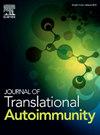Cell-specific epigenome-wide DNA methylation in peripheral CD4(+) lymphocytes from patients with primary biliary cholangitis
IF 3.6
Q2 IMMUNOLOGY
引用次数: 0
Abstract
Background/aims
Primary biliary cholangitis (PBC) is a chronic cholestatic autoimmune liver disease, triggered by a complex interplay between genetic, environmental and epigenetic factors. We investigated the methylation profile of peripheral CD4(+) lymphocytes from PBC patients compared to healthy controls (HC) and autoimmune hepatitis (AIH) patients, to elucidate gene specific epigenetic modifications that contribute to PBC pathogenesis, as similar data are limited.
Methods
CD4(+) lymphocytes were isolated from 8 PBC treatment-naïve patients, 9 HC and 10 AIH patients at diagnosis by ROBOSEP platform. Whole genome methylation analysis was performed by 850k array of Illumina. Candidate genes’ transcriptional expression was quantified by RT-PCR.
Results
Comparison between PBC patients and HC, revealed 1016 differentially methylated positions (DMPs) on autosomal chromosomes and 1203 DMPs on X chromosome (>98 % hypermethylated), corresponding to 695 and 322 genes, respectively (p < 0.05). Hypermethylation mainly affected pathways of immune cells differentiation and signalling (CAMTA1, PRKARB, LNC01993, TLR9). Methylation analysis between PBC and AIH revealed >5000 DMPs (98 % hypermethylated in PBC) corresponding to >4000 genes. Pathway analysis retrieved an enrichment of “cytokine” and “interleukin” signalling (C1GTNF3, SMAD3). Analysis of differentially methylated regions showed enrichment on gene promoters and hypermethylation of IFN-regulated genes (IFNGR2, TICAM2) in PBC patients. Genes expression at the transcriptional level showed over-expression of IFNGR2 in PBC patients.
Conclusions
Hypermethylation characterizes most genes of peripheral CD4(+) lymphocytes in PBC. The epigenetic modifications mainly affect pathways of immunological responses. The significant number of X chromosome located DMPs, further supports the role of sex in PBC pathogenesis.

原发性胆管炎患者外周血CD4(+)淋巴细胞的细胞特异性表观基因组DNA甲基化
背景/目的原发性胆汁性胆管炎(PBC)是一种慢性胆汁淤积性自身免疫性肝病,由遗传、环境和表观遗传因素复杂的相互作用引发。与健康对照(HC)和自身免疫性肝炎(AIH)患者相比,我们研究了PBC患者外周血CD4(+)淋巴细胞的甲基化谱,以阐明导致PBC发病的基因特异性表观遗传修饰,因为类似数据有限。方法采用ROBOSEP平台分离8例PBC treatment-naïve患者、9例HC患者和10例AIH患者的scd4(+)淋巴细胞。全基因组甲基化分析采用Illumina 850k阵列进行。采用RT-PCR定量检测候选基因的转录表达。结果PBC患者与HC患者在常染色体上发现1016个差异甲基化位点(dmp),在X染色体上发现1203个差异甲基化位点(>; 98%高甲基化),分别对应695个和322个基因(p < 0.05)。高甲基化主要影响免疫细胞分化和信号通路(CAMTA1, PRKARB, LNC01993, TLR9)。PBC和AIH之间的甲基化分析显示,5000个DMPs (PBC中98%高甲基化)对应4000个基因。通路分析获得了“细胞因子”和“白细胞介素”信号(C1GTNF3, SMAD3)的富集。差异甲基化区分析显示PBC患者基因启动子富集,ifn调节基因(IFNGR2, TICAM2)高甲基化。转录水平基因表达显示IFNGR2在PBC患者中过表达。结论PBC患者外周血CD4(+)淋巴细胞大部分基因存在过甲基化。表观遗传修饰主要影响免疫应答途径。大量的X染色体位于dmp,进一步支持性别在PBC发病机制中的作用。
本文章由计算机程序翻译,如有差异,请以英文原文为准。
求助全文
约1分钟内获得全文
求助全文
来源期刊

Journal of Translational Autoimmunity
Medicine-Immunology and Allergy
CiteScore
7.80
自引率
2.60%
发文量
33
审稿时长
55 days
 求助内容:
求助内容: 应助结果提醒方式:
应助结果提醒方式:


